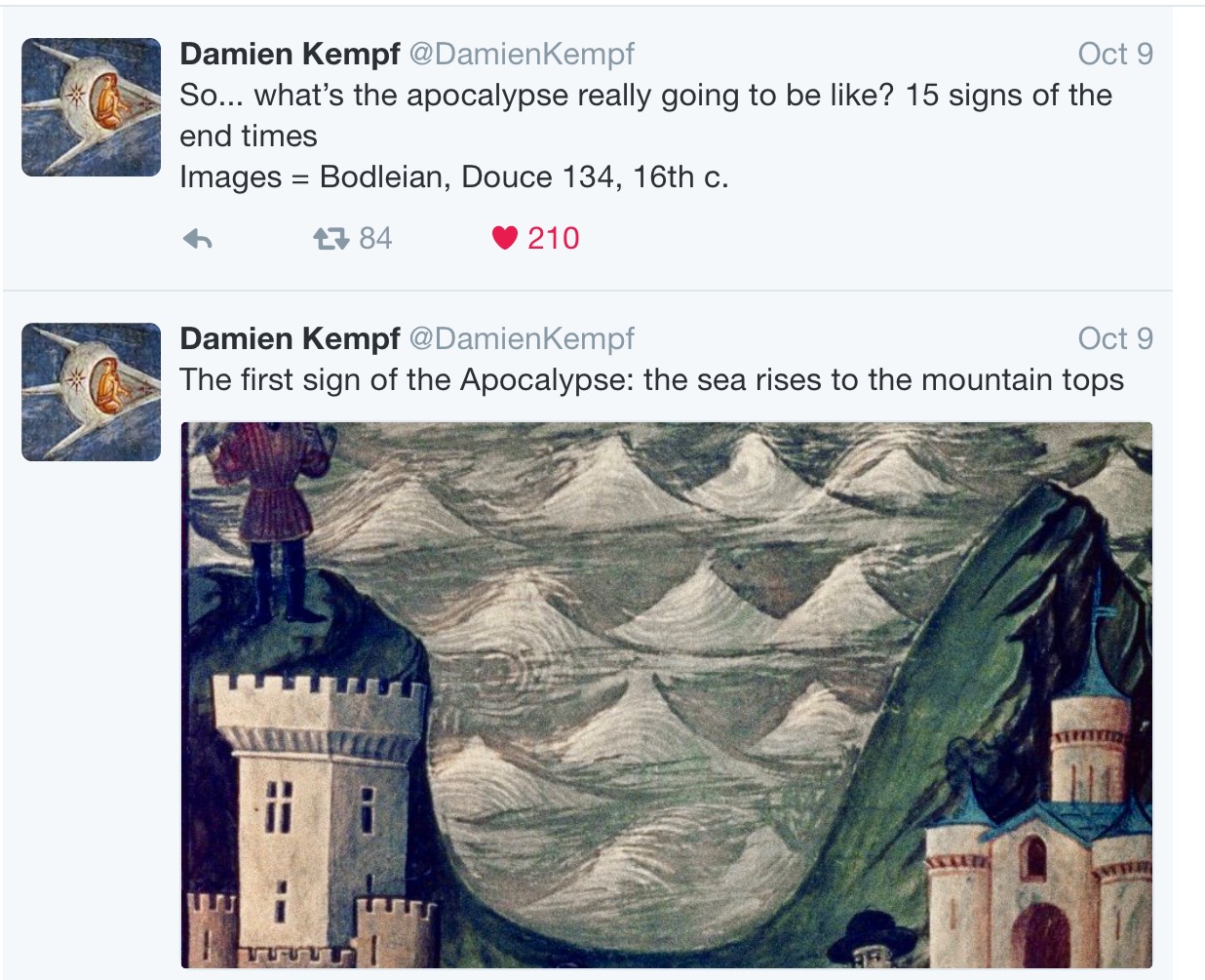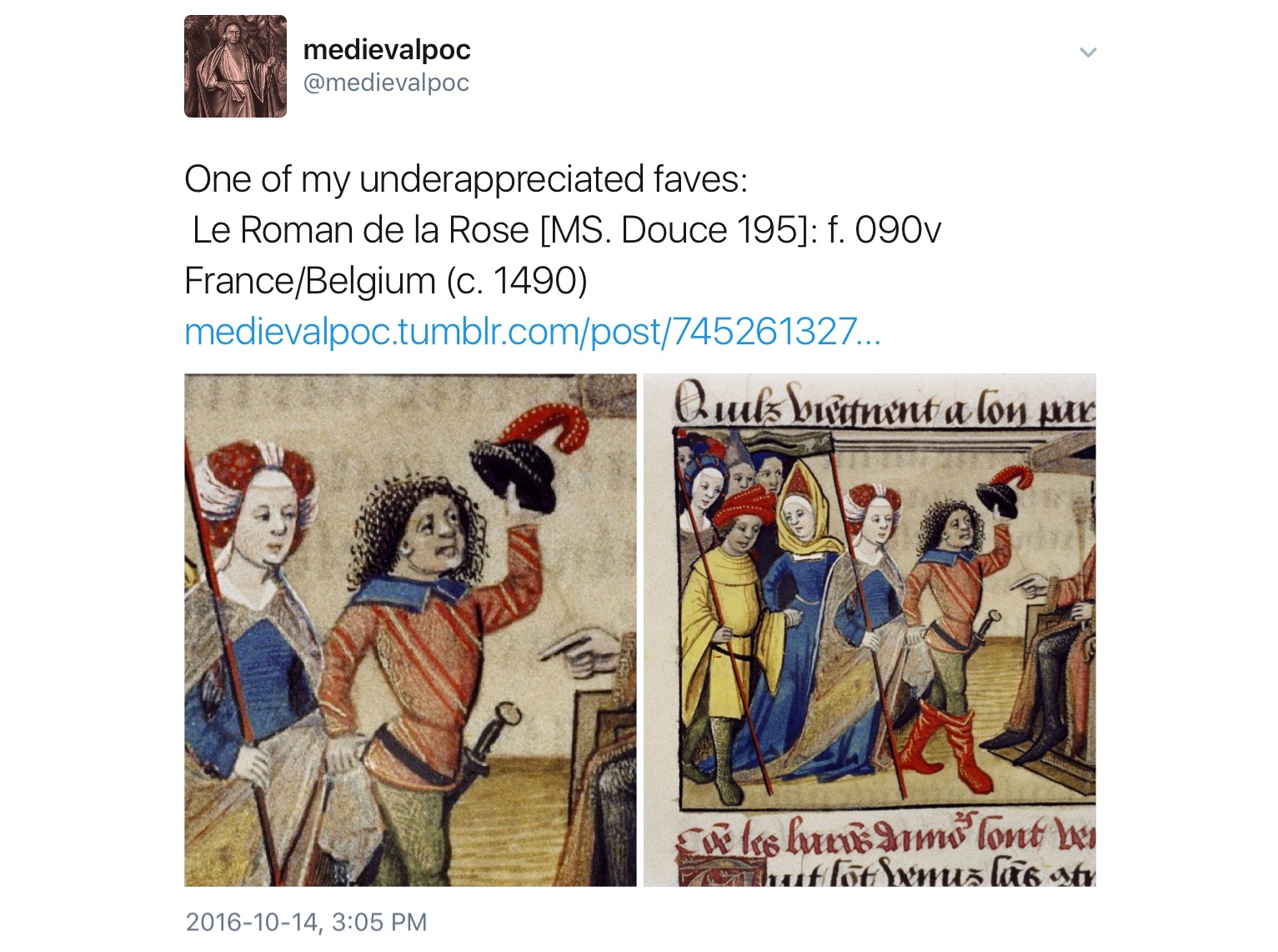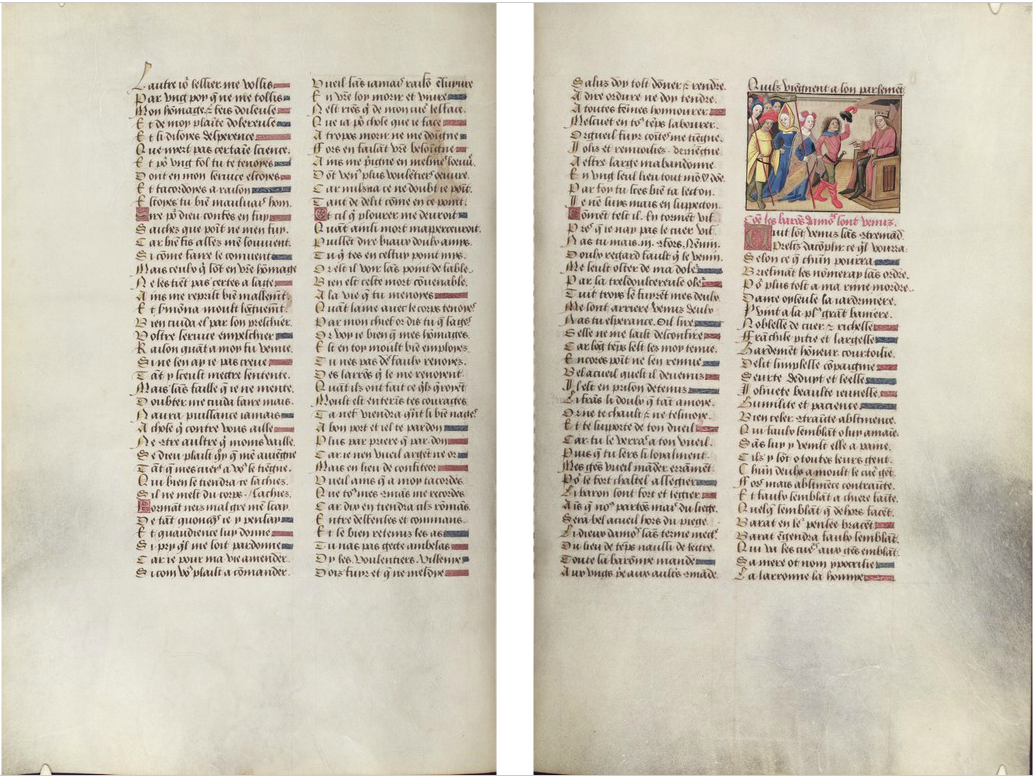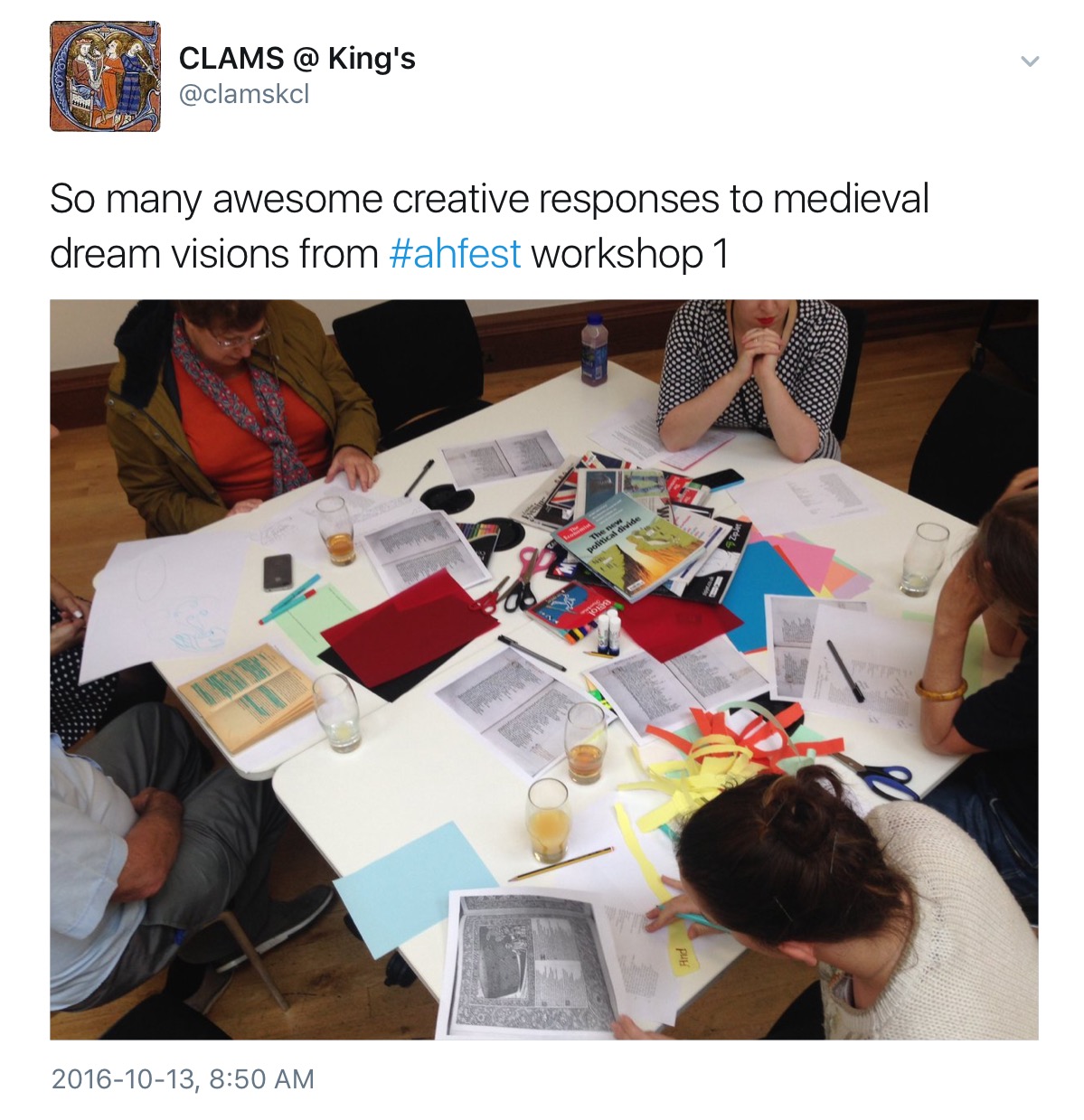Bodleian, Douce MS 134; from a Twitter thread by Damien Kempf
ARITHMETIC
- reading: False Semblance, prophesy, calculations and time (and timelessness and being out of time), apocalypse (Roman de la Rose 3-14, 21-26, 168-193, 307-308, 312-318)
Bodleian, Douce MS 195 f. 74r, top of second column; a Twitter post by@medievalpoc referring to MedievalPOC: People of Color in European Art History
MIDTERM PLOT SUMMARY & RECAP TIME
Context for image above: this is a two-column manuscript. On this two-page spread (73v-74r), Love quizzes the Lover on his upholding of the Ten Commandments (from l. 10299 onwards), which also allows for some plot revision / reminders.
- At the end of f. 73v column 2 and the top of 74r column 1, the Lover shows he has retained them, by reciting them in their shortest version, and Love praises him (l. 10373-74, 10375-84). The Lover explains that he has lost one of the “comforts” that Love gave him, Fair Welcome, who is imprisoned. Love promises to reward his vassal’s loyal service by rescuing FW.
- 74r column 1 ends with Love assembling his barons in parliament (l. 10409-12); the top of column 2 continues (being careful not to split a couplet), then there’s your rubricated image, and then the rest of column 2 lists Love’s barons… including introducing False Semblance (l. 10428-40); with the last four lines of his introductory description, and Love’s reaction to his presence, over the page.
- 73v-74r neatly demonstrates how reading across lines of verse, down columns, and page-turning are physically incorporated into the book for that “and what happened next?” momentum, pace, and suspense.
Next: Love’s speech, and the interruption / digression in the middle of it by our good FS himself (to explain himself so as to be accepted into the army: l. 10889-11980).
Which brings us up to date (as it were), and to this week’s classes!
TUESDAY
1 Discussion of blog questions & comments on week 6 (this ended up taking up more of class than predicted)
2 Image work with Romandelarose.org:
- Medieval “history,” “literature,” and “power”:
Look for signs of feudal imagery & the power-politics, ex. ruler + nobles, signs of promises & swearing fealty:
—#32, Amors explains his commandments;
—#113 & 152, Love & his barons, barons proclaim their support to Love;
—Genius
3 TO THINK ABOUT FOR THURSDAY:
Genius & False Semblance speeches: consider who the intended audience/s is/are and how they are being appealed to:
—How far is the Rose (or: how far can we still think of it as only/purely) a “courtly” work?
See for example the illuminations in BNF fr 9345 (+ ms description): flick through the manuscript and imagine that you are an illiterate noble…
—Questioning “history,” “literature,” “power”
—Questioning & criticism of power-politics, property (inc. trade, money, finance), “wealth,” “values,” “nobility,” “lineage”: from within (lower hierarchical ranks, outer edges) and
—What is the role of clerks in these parts of the text? How are they all used to, referred to, represented, perceived, viewed?
THURSDAY
1 Student presentation & class discussion
2 Timelessness, time out of joint, being outside time or in several times at once, flipped times & realities, and Apocalypse Now
- Applied arithmetic & calculations: End Times (the study of which = eschatology) and a “dark age” in the future
—Death (future, past, ever-present) and human egalitarian universal; “the great leveller“; in common to all regardless of rank and privilege (but not truly democratic: subject to external forces); see also, Fortune
Hope: for heaven after death
—Hell (continuing, other-/underworld, or outside time)
—Apocalypse (future):
Apocalypse, catastrophe, cataclysm; monsters and other hybrids (ex. FS himself)… or future paradise, a new golden age?
Hope: for heaven after The Last Judgement (of the living and the dead)
—Apocalypse within a “universal history and everything” book: Cambridge University Library MS Gg.1.1
- Apocalypse now: real/actual/temporal/worldly/earthly flat-footed practical everyday life and that other human universal that is The Real Dark Ages
—Cambridge University Library MS Gg.1.1 includes a history of Edward I of England (late 13th-early 14th c.)
—Survival and/as subversion:
the philology of subversion, and verse and words associated with it;
ploughing and its earlier and Medieval history, including a technological innovation impossible without arithmetic (and logic and geometry); and a reminder not to lose sight of external reality, the bigger picture, in a social history that is at once larger and that of le “petit” peuple: food and famine and death
An image from last week:
.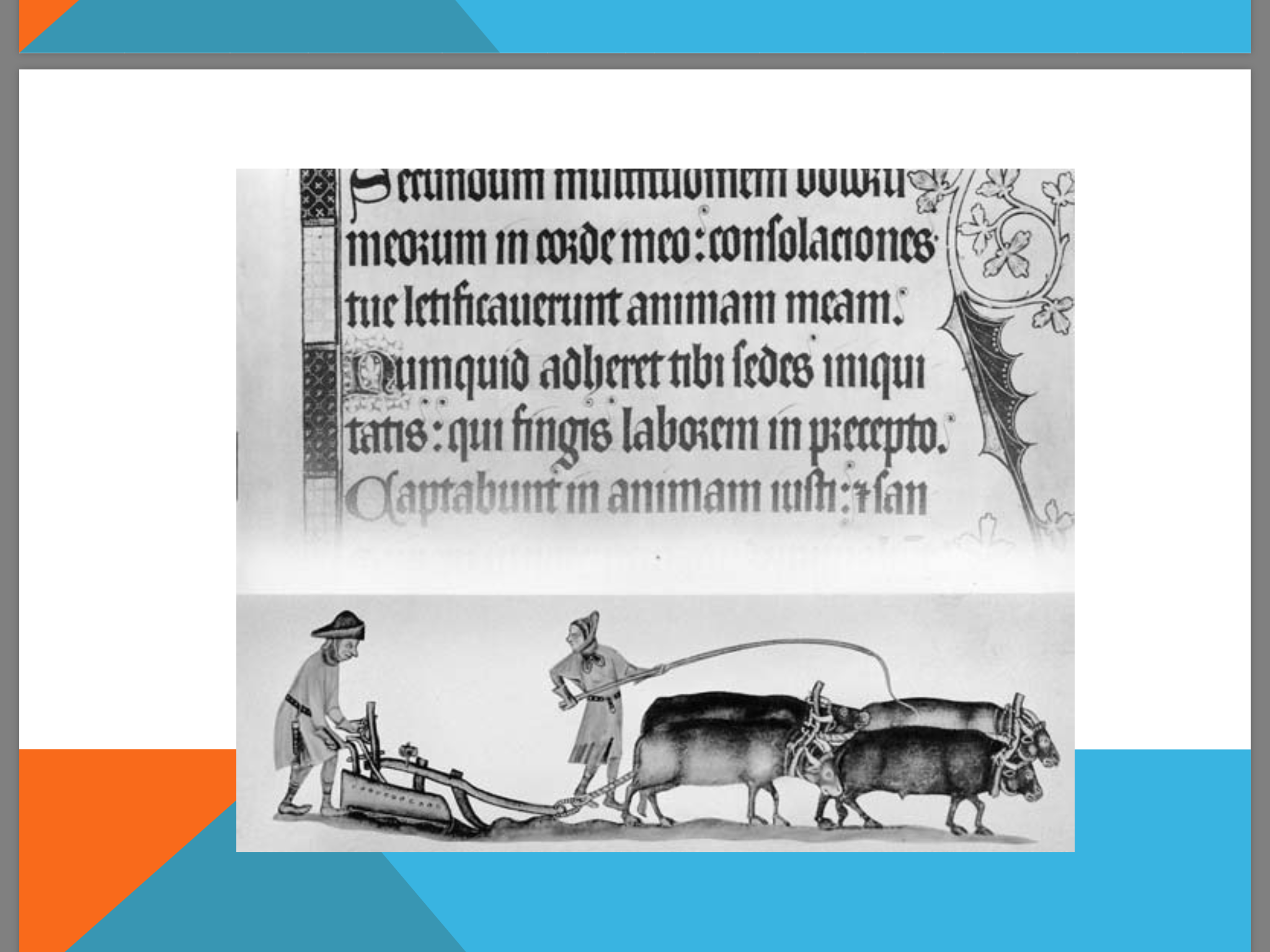
(via our presenters last week)
See also: the Domesday book (timely: St Martin’s Day and the collection of taxes, 8 November)
Also: being aware and wary of assumptions about “history” being the history of royalty, prestige, and power, as prejudices can be perpetuated even when “history” is extended from a Eurocentric focus to include other peoples and places…
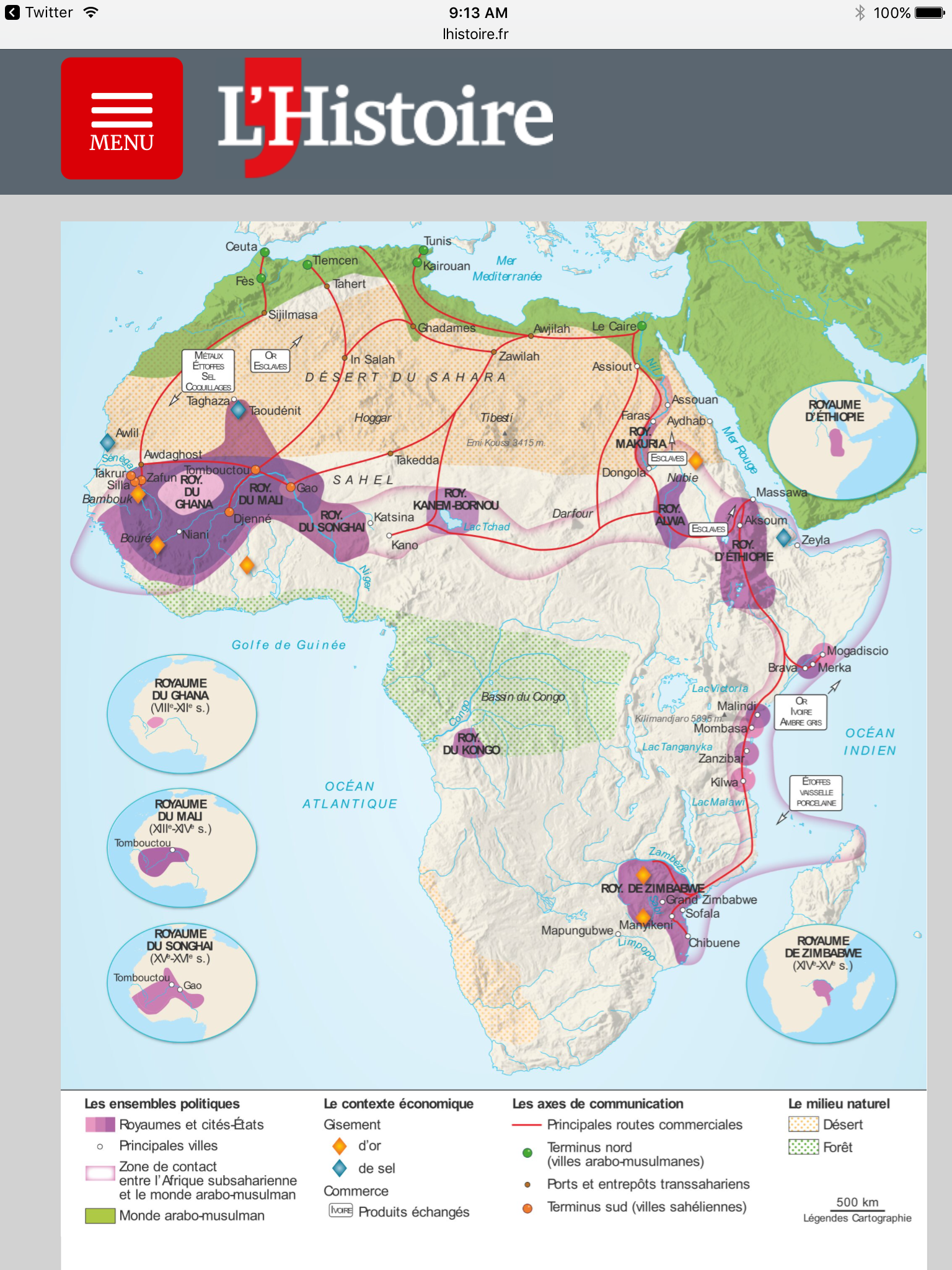
… and even if that restrictive view of history is pretty and good for tourism and thus the economy and (at least in theory) for people overall: here, a Vancouvercentric vision of Old Europe…
2b SIDE-NOTE: History/Histories:
- look at central reference points
—nostalgia for a mythified Golden Age past before a Fall → present → dark or shiny future
—mortal dread of non-being, annihilation
—point of view: ex. “middle ages,” “illuminated/dark ages” = for whom? - History (1): this world continues + hope for an afterlife (in another world or a parallel coexisting one)
—Ancestors and a spirit world
—Heroism can lead to the reward of immortality as a deity or other higher-order being
—(as feat. in the Rose): the Classical Greco-Roman Golden Age → Silver → Bronze → Iron → ? - History (2): we are somewhere in the middle, then history ends with End Times + hope for heaven / peaceful perfect paradise
—pre-Christian → from Christian conversion onwards (= when the Roman Emperor Constantine I (met earlier re. York) converts (312) and Christianity becomes the official state religion of the Roman Empire (380)) → The End Of The World and hope for eternal heaven
—Age of the Father = events covered by the Old Testament → of the Son = New Testament → of the Holy Spirit = from the first Pentecost up to the Second Coming of Christ (and the end of the world and hope for eternal heaven)
—A universe moving from the Big Bang towards a tendency for entropy to increase (ending in heat death) - History (3): we are somewhere along a line, moving forwards through defined periods + hope for paradise here on earth
—moving towards liberal democracy including individual and minority rights, tolerance, freedoms ex. of religion: with as key stages
renaissance humanism(s) → The Enlightenment → the French Revolution → Modernity = future hope
—19th-20th century capitalist and imperial/ist version: ages defined by changes in the means of production, economy, and labour (agrarian → industrial → post-industrial), in a grand march of progress punctuated by revolutionary “leaps”: Hegelian dialectical materialism, Marxism, historical materialism:
aristocracy →revolution→ bourgeoisie →revolution→ dictatorship of the proletariat = future hope
—a history of technological and scientific innovation, again moving forwards, with periods / ages / epochs / eras defined by evolutionary (ex. Darwin) or other revolutionary paradigm shifts (ex. Kuhn, Foucault, Haraway):
period →paradigm shift→ period →paradigm shift→ etc. → future hope (ex. post-humanism)
—a variation in which history ends with a new Golden Age / Paradise on earth that lasts for a fixed time, usually 1000 years; includes (social, political, and/or religious) millenarianism and (a subset) millennialist religious groups/sects/cults - History (4): cyclical, wavy, spiral, and other shapes and movements (may coincide, overlap, or otherwise flow into one or more of the above… ex. Latour)
—repeated reincarnation, moving “up” or “down” in the next life
—Ecocriticism, the anthropocene, a Singularity/~ies
—a world that has already ended, begun again, continued: Golden Age (and silver, bronze, iron), the Roman Empire and medieval European history from an eastern Mediterranean point of view (= the continuation of the Roman Empire after the fall of Rome) - History (X): Further histories not covered or alluded to above: …??? (add in comments on week 7)
3 In the middle of the weird space-time-(dis-)continuum that is a dream narrative outside time: an interruption by the real world outside and a date, in numbers.
- Image work with Romandelarose.org:
—Those outside of power, or on its borders: including writers
—The place of criticism and critics
—#88 & 114, author portraits
—False Semblance & Constrained Abstinence in disguise as members of the clergy (specifically, as a Franciscan or Dominican)
- Clerks, clerkliness, a clerkly (sub-/ counter-)culture:
—Appealed to through references to writing and studying
+ use of puns and punning poetic devices (grammatical rhyme, adnominatio)
—Who: religious / clerics (in training or ordained)
+ some clerks in training = students (inc 13th-c ancestors of geeks, nerds, hipsters, flâneurs, free spirits, critics, inventors & innovators, revolutionaries, and other applied thinkers)
—A reminder that both groups include nobles (and others who have bought their way in) but that clerkliness is also a meritocratic way to education, stable life, social mobility, “success” and power; open to all, based on talent-spotting (which is as controversial then as it is now) regardless of birth, wealth, or priviledge
—Clerk-professional-writers, white-collar literate workers, scribes, secretaries, recorders, note-takers, historians, storytellers; and anyone literate & anyone with a liberal arts education (or equivalent) is a potential future reader… and writer…
—… and part of a longer historical continuum, intellectual history / the history of ideas, resisting (but fearful of) fashion and Fortune’s wheel
—Critical topics: the general (e.gg. humanity, hubris, hypocrisy) and the particular (specific to clerks and their culture, and to their immediate external reality)
- At the Rose‘s centre: a real physical book, writers, and events in the real world
A romance trope of the period, mise en abyme ekphrastic self-referentiality:
—Knowingly dreaming, lucid dreaming, visions, prophecy, and seeing your own tomb (ex. Lancelot)
—The mirror-book that doesn’t exist yet: except that Genius refers to the Romance of the Rose as a book that already exists: p. 306 (19835))
—Guillaume de Lorris and Jean de Meun don’t exist yet: in his address to his army, Love refers to the future G & J and to future readers within a section on authors: p. 161 (10465) – 164 (10651)
—Guillaume de Saint-Amour (punning name is actual and accidental; De periculis novissimorum temporum, 1256): p. 177 (11479), 182 (11757)
—A date!!! 1255: p. 182 (11757)
- Rise of the mendicant orders / friars and what that has to do with antifraternalism and references to “The” University at the centre of the Rose:
—A date and a place!!! 1255: p. 182 (11757)
—the model for all humans: imitatio Christi: to varying degrees (we are not all expected to attain the level of hermits), and with frequent calls for reform, higher standards, questioning the accumulation of wealth especially when poverty exists
—ordinal/regular clergy/religious (bound by orders or rules)
vs secular clergy/religious (living “secularly” in the world: parish priests, bishops, etc.; own property, may own property individually)
—mendicants (begging as extreme poverty) = attached to a House, but out in the world and no fixed abode, no property
vs monasticism = contemplative, hermits in cells (or caves, or up pillars, walled up in bridges, up trees in forests, etc) or nuns and monks cloistered in convents / monasteries, property held communally
—Carmelites (mid-12th c.), Franciscans and Dominicans (both early 13th c.); the Augustinian friars (hermits uniting as a group) have just been granted papal formal foundation as an Order (1243)
—extremists & cross-fertilisations with other heterodox groups / heresies: the Fratellini in Umberto Eco’s Name of the Rose
—GdSA vs extremist millennialist Franciscans:
1200-ish: Joachim of Fiore idea = still in Age of the Son (not Holy Spirit) → a new revelatory work (replacing and transcending old Christian Scripture & Church) around 1250/60 would move the world into the Age of the Holy Spirit → the good (“the Order of the Just”) live as free happy equal peaceful monks for 1000 years.
SEE ALSO: side-note 2b higher up↑
1250: Gerald de Borgo Santo Donnino Introductorium in Evangelium Aeternum
1250s: the Evangilium Aeternum interpreted by Joachimites to be that promised new holy book and the Franciscan Order as that order
—1254: heresy and Paris University power-politics:
Increasing number and importance of Franciscans resented by secular masters, revolts, GdSA a ringleader & petitions pope Innocent IV, numbers of Franciscans teaching at Paris U restricted, pope dies, restrictions quashed by new pro-Franciscan pope Alexander IV).
Also involved: Bonaventure (Franciscan and one of those defending the mendicant orders against detractors like GdSA) stopped temporarily from teaching (1256?), John of Parma
- CONTEXTUAL BONUS: highlights from some exciting contemporary Church affairs:
—Fourth Lateran Council (1215): Joachim of Fiore doctrines declared heretical, tightening up on clerical chastity (I Wikiquote: “Canons 14-17: Against the irregularities of the clergy — e.g., incontinence, drunkenness, attendance at farces and histrionic exhibitions“), loosening up rules on consanguinity in marriage (from 7th to 4th degree, explained numerologically), new religious orders, money
—First Council of Lyon (1245): Rome besieged by Holy Roman Emperor, red hats for cardinals, money
—Second Council of Lyon (1272): results in the deaths of Aquinas and Bonaventure, excommunicating pirates, suppressing some mendicant orders, money
